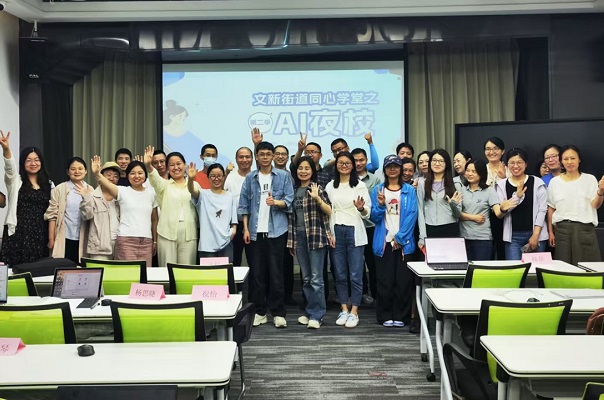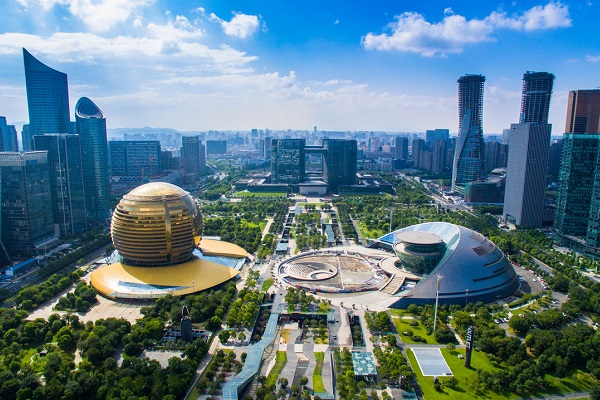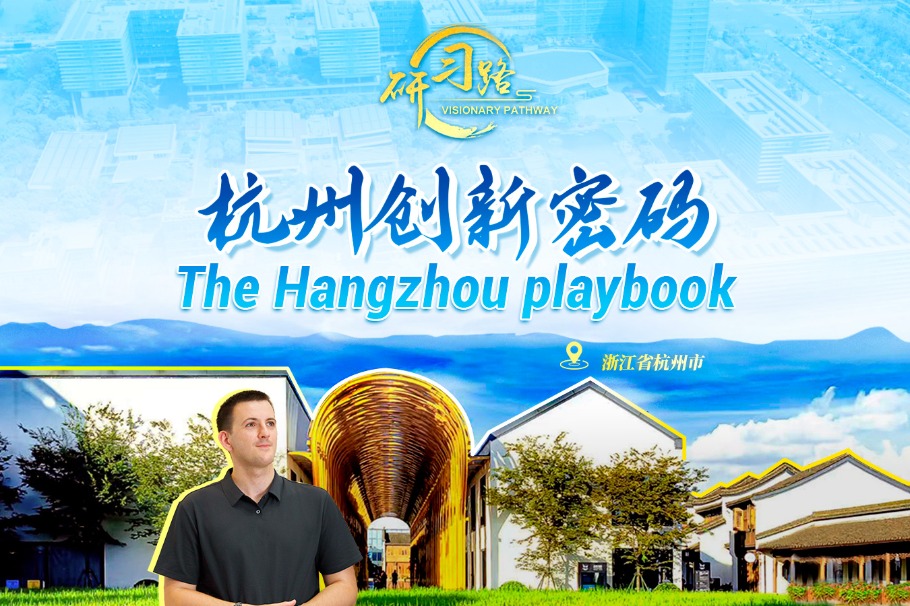Chinese people start to flock to 'AI night schools' amid AI industry boom
Editor's Note:
Large models, robots, intelligent manufacturing, autonomous driving... In recent years, artificial intelligence (AI) has made headlines around the world.
In real life, AI has permeated all aspects of human society, helping with scientific research in laboratories, assisting in the restoration of mysterious ancient scrolls at archaeological sites, and helping to find abducted children in the vast sea of humanity. The development of technology has also brought challenges in various aspects in ethics and law. Many experts advocate that humans should see technology as a tool created for the ultimate purpose of serving humanity, making life and work more efficient and comfortable.
In light of this, the Global Times has launched the "AI empowers industry and improves people's livelihoods" series, showcasing the tremendous energy and broad prospects that AI brings across every aspect of society. This is the seventh installment in this series, focusing on the booming AI-themed night schools in China.

A non-profit AI night school in Hangzhou, East China's Zhejiang Province Photo: Courtesy of Huang Xiaoqin
Dusk falls over Tianjin city in North China. Li Yifeng, a 24-year-old who has just finished work, grabs a quick meal before stepping into a community meeting room near his office. He pulls out his phone and, following his instructor's guidance, uses an AI tool to create a beautiful picture.
The moon hangs high in the sky of Hangzhou, East China's Zhejiang Province. Several delivery people, having shed their uniforms, sit attentively in a multimedia classroom within an entrepreneurial park, focused on an AI lesson displayed on the screen. Among them, 39-year-old Huang Xiaoqin quickly generates an AI greeting video using her own photo, and she smiles contentedly.
Amid the rapid development and widespread adoption of AI, many Chinese individuals of various ages and industries are flocking to "AI night schools" after a day of work or classes, eager to learn practical AI skills. Whether to enhance efficiency at their current jobs, seek part-time or new opportunities related to AI, or simply to cultivate a personal interest, they are striving to get closer to this new technological frontier.
AI-themed night schools are therefore emerging amid China's AI industry boom, providing low-cost and efficient ways for those in need to "catch up with the times," the Global Times learned. With support from local governments, social organizations, and AI enthusiast communities, these night schools offer a variety of free or affordable short-term courses, helping those interested to quickly get hands-on experience with AI-related tools.
Economic experts suggest that such AI night school initiatives can broadly assist diverse groups in breaking down technological barriers, and offer more income-generating possibilities particularly for flexible workers. "This is a way to promote the shared benefits of technology for all," Wang Peng, an associate research fellow at the Beijing Academy of Social Sciences, told the Global Times.
New job opportunities
Li works in operations at a pet company in Tianjin. One day in April, while walking near his office, Li got a flyer advertising an AI night school. Without much hesitation, he visited the school to learn more about the courses and quickly signed up.
"I'm quite interested in AI tech," Li told the Global Times. He had heard that some people were making extra money using AI tools, and noticed that some of his colleagues had largely improved their work efficiency with AI assistance. "So I wanted to learn about AI too, but I didn't know where to start."
The AI night school came at just the right time for Li. Over the next few days, he attended 10 classes held from 6.30 pm to 8.30 pm. There, he learned to generate AI articles, images, videos, and music in various styles using clear and logical commands. "Before that, I only knew how to ask AI assistants like DeepSeek for some simple questions, but now I've learned to use many different AI tools," he smiled.
The night school Li attended was built by a group of experienced local researchers in the AI industry, said the school's founder Liu Xingyu. Liu said that the school's tuition is 700 yuan ($97.3) for 10 courses, a relatively affordable price, and "it will offer free public courses in the near future."
At the night school, about 40 percent of the students are young graduates like Li, while some senior attendees come just for fun, Liu said.
Another big portion of the students consists of blue-collar workers and those in flexible employment, such as social media influencers, stay-at-home parents, and ride-hailing drivers. "These people have similar goals in learning to use AI tools: They are trying to explore more job opportunities or ways to increase their income through this new industry," Liu told the Global Times.
The AI night school in Tianjin has served over 80 students, with 25 percent of them already increasing their income through AI tools, according to Liu. They engage in relatively low-barrier AI creative design tasks, such as generating personalized images for companies or individuals, Liu explained.
After completing the night school courses, Li now takes on online gigs generating AI images in his spare time. His side business is doing well, earning him an extra 2,000 yuan each month, which is a satisfying amount compared to his regular monthly salary of 5,000 to 6,000 yuan. "The best part is that this side job is very easy and efficient with the help of AI tools," said Li.
In a context where traditional industries are saturated with workers while the demand for positions in emerging fields like artificial intelligence is growing, "AI night schools" represent a promising attempt to enhance employees' competitiveness, create new part-time opportunities for flexible workers, and alleviate structural employment issues, Wang Peng told the Global Times.
Benefiting more
Night schools that teach the use of AI tools are flourishing across China, benefiting many people.
In Shenzhen of South China's Guangdong Province, for instance, a residential community has launched courses on AI-driven design and video editing, covering more than 3,000 participants, as reported by people.cn on May 20. In Weifang, East China's Shandong Province, labor and social security authorities have partnered with vocational training schools to establish AI night school programs that teach how to incorporate AI technology into short video production, according to local media on May 7.
Compared to other technologies, many AI tools have a relatively low entry barrier. Users, regardless of their educational background or personal abilities, can quickly get the hang of these tools and start benefiting from them, both financially and emotionally, some AI industry insiders told the Global Times.
Delivery woman Huang has experienced this firsthand. Now, when training new delivery persons, she uses AI to create PowerPoint presentations, write scripts, and gather representative traffic rules and case studies. "It used to take me two days to make a PPT, but now I can do it in just two hours," Huang shared with the Global Times.
Huang is also the director of a nonprofit, public service organization called "Blue Rose" in Hangzhou. With the support of local government, "Blue Rose" has established a free AI night school that teaches how to use AI tools to create online avatars, write articles, and generate short videos. Experts from renowned tech companies in this city, such as Alibaba, also volunteer to teach classes, Huang said.
Many of the students at the "Blue Rose" AI night school are migrant workers or homemakers. Many of Huang's delivery person friends have also joined the program, expressing their interest in AI -- not only as a means to find new income opportunities, but also as a way to relieve stress, Huang said.
"Many laborers, including us delivery persons, work very hard every day and under a lot of pressure, so using AI to create fun little things is quite enjoyable," she said. "We treasure the emotional value that AI gives us."
Still a long way
According to a report released by Chinese job-hunting platform Zhilian Zhaopin in February, the number of job seekers in the AI sector surged by 33.4 percent in the first week following the 2025 Chinese New Year holidays, making it the fastest-growing industry for job applications. "The rapid development of AI has led to a surge in job seekers' enthusiasm for seeking employment in this field," the report commented.
However, this enthusiasm has led some to ponder whether a few weeks of "night school" programs can truly enhance one's job competitiveness. Moreover, as more individuals join the fray, could the AI industry also face the risk of "involution"?
To mitigate potential "involution," Wang suggests AI night schools optimize their curricula, tailoring content to the personal abilities and learning goals of different students. "For amateur learners, night schools could offer more scenario-based teaching that integrates AI tools with other industries, showing them how to effectively monetize AI. For those with a stronger foundation, there can be more advanced and subdivided content," he explained.
Song Donghuan, the founder of StoryStorm, one of China's earliest AI-generated video communities, launched AI night school programs as early as 2023. That year, he conducted several four-day night school sessions focused on AI short film production.
AI video creators can find part-time work in industries like advertising and film, Song said. Nonetheless, as currently societal acceptance of AI-generated content remains relatively low, their job opportunities are still limited, he said frankly. "There is still a long way to go."
Song himself devised a new approach to help AI video creators increase their income. Over the past two years, StoryStorm has partnered with various commercial and cultural brands to host weekly themed AI video competitions, sponsored by these brands. While individual prizes range only from a few hundred to a few thousand yuan, the sheer number of rewards and the low effort required to produce AI videos have attracted many participants, Song said.
Now this small competition continues to be held weekly. "For many participants, the prize money serves as a form of 'part-time' income, while the sponsoring companies also promote their brands. It's a win-win situation," Song told the Global Times.
"I once felt uncertain about how people can better utilize AI in life. But I'm optimistic to see the continued development and popularization of AI bring us more opportunities," said Liu, whose night school in Tianjin plans to work with local organizations in training voluntary AI instructors for non-profit courses.
"When AI steps out of the laboratory and truly empowers the everyday creativity and work of ordinary people, that will be the greatest social value of technology," he told the Global Times.
-
Visionary Pathway - Hangzhou Playbook
July 15, 2025



